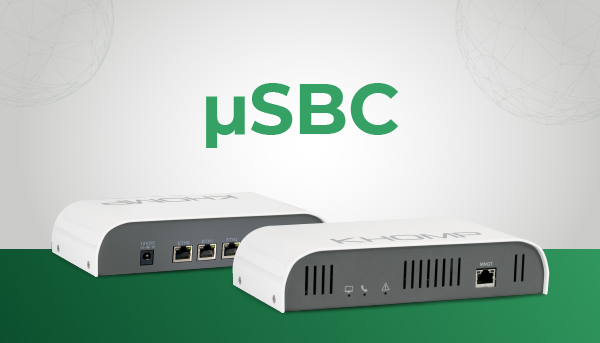In addition to cost reduction, the Voice over IP technology has enabled the popularization of telephony. Wherever there is an Internet connection available, you can have voice calls implemented to solve your daily issues much more quickly and assertively.
This is also the ideal scenario for medium and large companies in the process of expanding their activities to other cities and geographies by opening remote offices. Instead of implementing a full telephony infrastructure locally, the remote office can connect to the headquarters telephony system and share all the benefits already in place there.
“Picture this: a transport company headquartered in Florianópolis, in the state of Santa Catarina, is opening a new regional office in Curitiba, Paraná. The phone extensions in the new branch will be connected to the IP PBX system of the headquarters and will be included in the same carrier plan contracted for the Santa Catarina HQ. Also, the new μSBC Khomp enables the regional office to use a local VoIP operator from Curitiba in order to benefit from a cheaper local minute-based plan, while still ensuring the security of the local network and the headquarters,” explains Ygor Voltolini, Commercial Manager at Khomp.
The new μSBC Khomp enhances the security
Even though the headquarters and the branch offices are connected over a VPN, as well as the firewall, such connection does not guarantee the security of the voice network, only the security of the data network. The headquarters need to have a robust SBC installed between its IP PBX system and the connection with the carrier in order to ensure the security of the local network; and the branches need to have an SBC before their phone extensions in order to secure their connections.
Khomp μSBC enhances the security at the edge by protecting the corporate network from the many networks required for VoIP communication and by performing all necessary changes and validations.
Telephony services guaranteed to meet your daily needs
In addition to security, μSBC can maintain office communications even in the event of outages. In the case of a VoIP carrier failure, for example, the route failover capability will automatically search for another compatible route; in the case of an IP PBX failure, the Survivability feature enables the μSBC to take over basic functions, such as making and receiving external calls, making calls between extensions, and forwarding calls.
Routing
Another advantage offered by the μSBC is the ability to control telephony costs by configuring call routing rules per prefix and/or making use of VoIP carrier loyalty programs. This way, the user is able to define which carrier will be used to complete each external call, depending on the time of the day, the best rates available, etc.
For new and small businesses to be VoIP-native
For new businesses, cutting down on infrastructure costs is crucial to their success. Therefore, it is a great idea to start up with an IP telephony solution in place.
In such scenario, the μSBC will enable the connection between a cloud-based IP PBX system and up to two VoIP carriers, with all the aforementioned features already implemented. The best news is that it can start to operate with a minimum of four simultaneous calls. Then, as the company grows, the number of simultaneous calls can be scaled in increments of four up to a maximum of 28.
Would you like to know more?
Please refer to this page on our website, where you will find all the information you need about the μSBC. Also, please sign up for the Khomp Newsletter to learn about all our upcoming releases at first hand!
